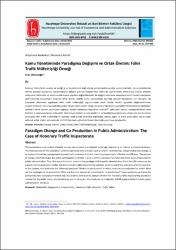Kamu yönetiminde paradigma değişimi ve ortak üretim: Fahri trafik müfettişliği örneği
Künye
Dilaveroğlu, A. (2022). Kamu yönetiminde paradigma değişimi ve ortak üretim: Fahri trafik müfettişliği örneği. Hacettepe Üniversitesi İktisadi ve İdari Bilimler Fakültesi Dergisi, 40(3), 587-604. https://doi.org/10.17065/huniibf.990332Özet
Kamusal hizmetlerin sunumu ve içeriği, iç ve dış etkenlere bağlı olarak yenilenmekte ve çağa uyarlanmaktadır. Kamu yönetiminde reform, yeniden yapılanma, reorganizasyon, değişim gibi kavramlarla ifade edilen bu uyarlamadaki temel amaç mevcut yönetim anlayışının, daha etkin ve süreci verimli kılacak yapılarla değiştirilmesidir. Bu değişim sürecinde vatandaşın kamu hizmeti süreçlerine aktif katılımda bulunmasını öngören ortak üretim modeli, kamu yönetiminde üzerinde durulan konulardan biri olmuştur. Bu çalışmada ülkemizde uygulanan fahri trafik müfettişliği uygulamasının ortak üretim modeli açısından değerlendirilmesi amaçlanmaktadır. Bu amaç doğrultusunda; “Ortak üretim nedir? Hangi alanlarda ortak üretim yapılabilir? Ortak üretimin tipolojileri nelerdir? Ortak üretim yapılmasını sağlayan temel motivasyon kaynakları nelerdir?” şeklindeki sorular cevaplandırılarak ortak üretimin kuramsal çerçevesi çizilecektir. Betimleyici yöntem ve vaka analizinin kullanıldığı bu araştırmada, ortaya konulan kuramsal çerçevede fahri trafik müfettişliğinin kamuda ortak üretim sistemine uygunluğu, işleyişi, yapısı ve trafik güvenliğine katkısı analiz edilecek, ortak üretim konusundaki sınırlı Türkçe kamu yönetimi literatürüne katkı yapılmaya çalışılacaktır. The presentation and content of public services are renewed and adapted to the age, depending on internal and external factors. The main purpose of the adaptation, which is expressed with concepts such as reform, restructuring, reorganization and change, is to replace the existing management approach with structures that will make the process more effective and efficient. The process of change, which envisages the active participation of citizens in public service processes, has been one of the issues emphasized in public administration. Thus, this research aims to examine the paradigm shift in public administration from the 19th century to the present, the co-production model, and the honorary traffic inspectorship practice, which is one of the examples of this in practice. In this context, this study asks the following questions “What is co-production? In which areas can co-production be made? What are the typologies of co-production? What are the main sources of motivation for co-production?” those questions can frame the joint production. Descriptive method and case analysis were used to analyze whether the honorary traffic inspectorship practice is suitable for the public sector, it's functioning, and its structure. This study on co-production will fill a gap in limited Turkish public administration literature.


















